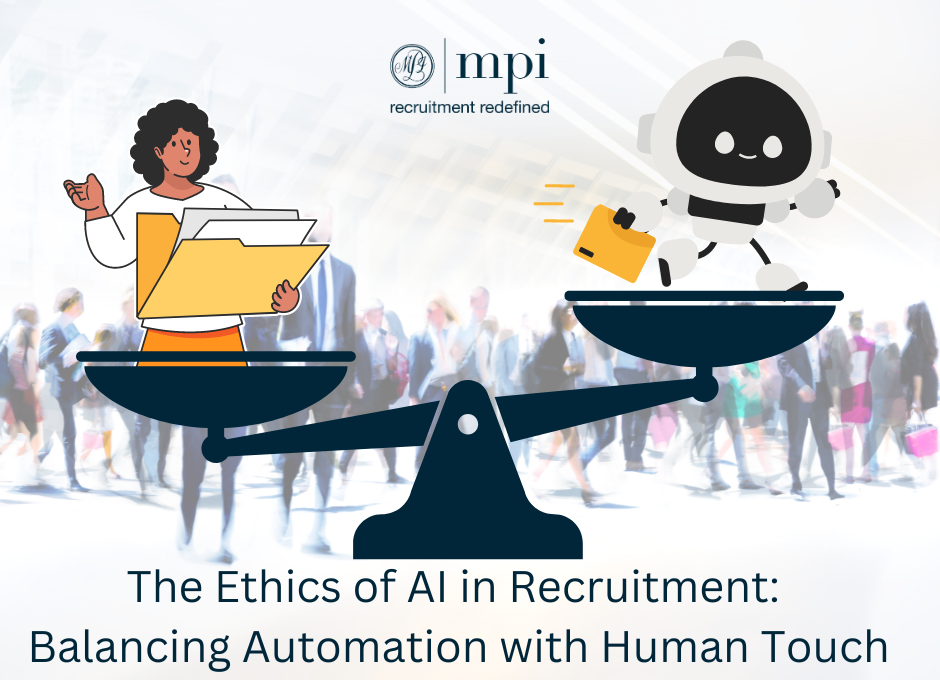
The Ethics of AI in Recruitment: Balancing Automation with Human Touch
In today’s fast-evolving recruitment landscape, the use of artificial intelligence (AI) is becoming more common place. While it offers the promise of efficiency and precision, especially in sectors like engineering where finding the right talent can be particularly challenging, there are growing ethical concerns about relying too heavily on automated systems. For agencies like ours, who have aways, and still do focus on a more personal, human-led approach, it’s essential to weigh the advantages of AI against the potential pitfalls, ensuring that the delicate balance between technology and human interaction is maintained.
The Rise of AI in Recruitment
AI in recruitment can streamline processes like CV screening and selection, interview scheduling, and bias reduction in the written word, making it easier for agencies to manage large volumes of applicants. In engineering recruitment, this has the potential to be a game-changer, particularly given the increasing demand for specialised skills as the industry struggles with a talent shortage.
However, AI is not a magic bullet, and it is important to recognise the ethical implications that come with its use. Automating parts of the recruitment process risks introducing biases, reducing transparency, and, of course, dehumanising the experience for both candidates and recruiters.
Ethical Concerns in AI Recruitment
1. Bias and Fairness
AI systems are trained on historical data, which can sometimes reinforce existing biases. In an industry like engineering, where diversity is an ongoing challenge, relying on AI without proper checks can exacerbate these issues.
There have been cases where AI systems, unintentionally, favoured certain demographics based on previous hiring trends, which often reflected societal imbalances. As an agency, it’s crucial to ensure that any future use of AI does not unintentionally perpetuate these biases.
2. Lack of Transparency
One of the most significant concerns with AI-driven recruitment is the lack of understanding and clarity about the nature of its algorithms. Candidates may not fully understand how decisions about their applications are being made, and recruiters using it might struggle to explain why certain individuals are shortlisted while others are not. In engineering roles, where specific skills and qualifications are paramount, this lack of transparency can be frustrating for both recruiters and candidates alike. This could lead to a lack of trust in the agency and something we would want to resolve before we look to move into an AI driven system.
3. Dehumanisation of the Process
While AI can handle repetitive tasks efficiently, it lacks the emotional intelligence and experience that a human recruiter brings to the table. Engineering recruitment goes beyond the CV and the technical skills especially for short term roles. These are areas where human intuition plays a critical role. Striking the right balance between automation and personal interaction is key to maintaining trust and rapport with candidates.
Why Human Touch Still Matters
Here at MPI, the personal touch remains a cornerstone of the recruitment process. It is how we started 62 years ago and is one of the things that sets us apart. Engineering roles, particularly those in sectors struggling with a skills gap, require careful consideration. The ability to have in-depth conversations with candidates, understand their career aspirations, and match them with roles that truly fit their skill set cannot be fully replicated by an algorithm.
Human recruiters are better equipped to handle sensitive situations, such as coaching candidates through difficult career transitions, like our work with armed forces leavers, or managing the expectations of both clients and candidates in a way that fosters long-term relationships. This is particularly important in engineering sectors facing workforce shortages, where the competition for skilled professionals is fierce.
Moving Forward: Responsible Use of AI
While we are not currently using AI in our recruitment processes, we recognise that the future may involve more technology-driven tools. However, it is essential that we approach any integration of AI with caution, ensuring that it complements rather than replaces human interaction.
A responsible approach to AI in recruitment should involve regular audits of any automated systems to ensure fairness, transparency, and accuracy. It should also allow for human oversight, so that our recruiters can intervene where necessary to correct potential errors or biases. Most importantly, AI should be used as a tool to enhance, not replace, the deep personal connections that make MPI’s recruitment process successful.
Conclusion
As AI continues to shape industries, all recruiters must carefully consider its ethical implications, especially when specialising in critical sectors like engineering. By maintaining a balance between automation and the human touch, we can ensure that we uphold the values of fairness, transparency, and empathy, which are essential to building trust with both clients and candidates.
While the future may involve more technology, the heart of our recruitment will always be human.
